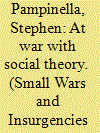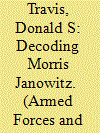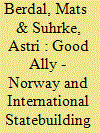|
|
|
Sort Order |
|
|
|
Items / Page
|
|
|
|
|
|
|
| Srl | Item |
| 1 |
ID:
142605


|
|
|
|
|
| Summary/Abstract |
As US counterinsurgency campaigns draw to a close, doctrine for asymmetric warfare written during the War on Terror has come under heavy criticism. While many have argued that this shift to ‘winning hearts and minds’ is evidence that the United States is taking humanitarianism and nation-building seriously, others argue that a wide gap exists between US counterinsurgency doctrine and the protection of civilians afflicted by conflict. In this article, I show that the latter is true by comparing theories of instrumental and communicative action to US doctrine for operational design, stability operations, and counterinsurgency. I argue that these texts treat the people as an object to be manipulated for the achievement of pre-determined self-interested strategic goals rather than members of a community that jointly designs operations to fulfill shared objectives. However, US doctrine does contain communicative elements that, if prioritized, would better support humanitarian and state-building objectives otherwise subordinated in the War on Terror.
|
|
|
|
|
|
|
|
|
|
|
|
|
|
|
|
| 2 |
ID:
173753


|
|
|
|
|
| Summary/Abstract |
The American sociologist Morris Janowitz presented two world views of security named “absolutist” and “pragmatist.” This dualistic paradigm endures into the 21st century and explains how complex and contentious security options are debated within the U.S. security establishment. His paradigm also reveals a condition called the “hegemon trap,” which means that the more powerful militarily that a state becomes relative to other states, the less likely it will fight a large-scale conventional war, resulting in frequent and perpetual limited, low-intensity, and unconventional wars. Based on experiences learned since the Vietnam War, the United States can improve global security by balancing resources between absolutist and pragmatist outlooks. This requires devoting a greater share of resources toward peacetime engagement, stability operations, and unconventional warfare.
|
|
|
|
|
|
|
|
|
|
|
|
|
|
|
|
| 3 |
ID:
158004


|
|
|
|
|
| Summary/Abstract |
The article examines the findings of the Commission of Inquiry established by the Norwegian government in 2014 to evaluate all aspects of Norway’s civilian and military contribution to the international operation in Afghanistan from 2001 to 2014. Concerned with the wider implications of the Commission’s findings, it focuses on two issues in particular: (1) Norway’s relations with the US, a close and long-standing strategic ally whose resources, capabilities and dominance of decision-making dwarfed that of all other coalition partners in Afghanistan; and (2) Norway’s record in the province of Faryab, where, from 2005 to 2012, a Norwegian-led Provincial Reconstruction Team was charged with bringing security, good governance and development to the province. How Norway prioritised and managed relations with the US highlights and helps to problematise the challenges – political, practical and moral – facing small and medium-sized powers operating in a coalition alongside the US. Norwegian efforts in Faryab are revealing of the dilemmas and contradictions that plagued and, ultimately, fatally undermined the international intervention as a whole. As such, Norway’s experience provides a microcosm through which the inherent limitations of the attempt to transfer the structures of modern statehood and Western democracy to Afghanistan can be better understood.
|
|
|
|
|
|
|
|
|
|
|
|
|
|
|
|
| 4 |
ID:
080790


|
|
|
|
|
| Publication |
2008.
|
| Summary/Abstract |
Today there are many calls for other elements of the government to do more to 'do their part', assist the military to restore order and stability and 'win the peace' in Iraq and Afghanistan, and prepare for similar roles in future conflicts. The authors here instead briefly review the history of US armed forces' involvement in military governance operations from the Mexican War through World War II, and recommend the re-establishment of a School of Military Government similar to that created during the latter conflict
|
|
|
|
|
|
|
|
|
|
|
|
|
|
|
|
| 5 |
ID:
074922


|
|
|
|
|
| Publication |
2006.
|
| Summary/Abstract |
The subject of stability (and reconstruction) operations will be discussed explicitly, but it should be understood that this subject has to be regarded as a highly dependent variable. Stability operations, the demand for them and the provision of new capabilities to perform them well, are the downstream product of larger decisions on foreign policy and strategy.
|
|
|
|
|
|
|
|
|
|
|
|
|
|
|
|
|
|
|
|
|